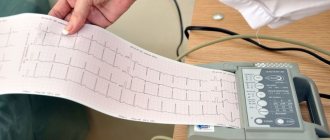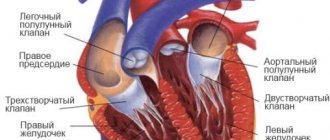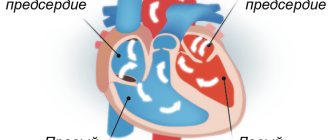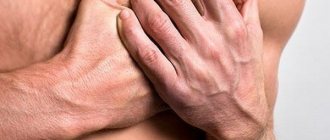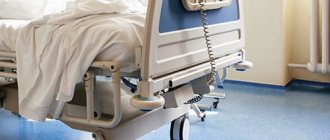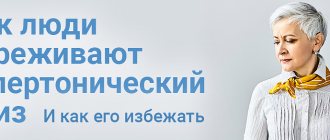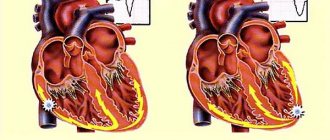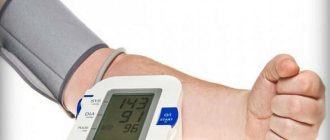- Causes
- Pathologies
- Diagnostics
- Treatment
- Our doctors
If your heart is beating fast, it is normal to feel it. In cases where the condition is caused by physiological factors, the state of health returns to normal on its own, without visiting a doctor.
Every person has experienced heart palpitations at one time or another. This condition can be either normal or pathological. Only a doctor can determine the exact cause after an examination, but you can independently determine whether you should rush to a specialist or not to worry.
Causes of increased heart rate
When assessing a person’s condition, one must take into account the pulse: is it elevated or normal. If your heart is beating fast, it is normal to feel it. Physiological reasons for this condition:
- strong excitement;
- age up to 7 years;
- exercise stress;
- fright;
- poisoning;
- drinking coffee and other tonic drinks.
In cases where the condition is caused by physiological factors, the state of health returns to normal on its own, without visiting a doctor.
The feeling of palpitations is also characteristic of some pathologies. Most often this is associated with endocrine, vascular and neurological disorders. In this case, a comprehensive diagnosis is required to determine the cause.
When to see a doctor?
The cardiologist notes that you should contact a doctor without waiting for any additional signals from the body - just a rapid heartbeat will be enough to go to the appointment. “The doctor will prescribe an electrocardiogram to check the functioning of the heart, may suggest daily monitoring of the heart rhythm, and based on the results will make a decision. It is even possible that this is atrial fibrillation, which is not only treated with medications, but is also offered surgical intervention. By the way, it is good when a doctor suggests surgery, but patients often have a natural fear of this. However, it is worth understanding that surgical intervention also has certain contraindications, so it cannot always be carried out. Then they will use only drug therapy with special cardiac antiarrhythmic drugs,” says Olga Molchanova.
As a rule, if such a heartbeat was a one-time occurrence and does not occur again, there is no need to worry. But at the same time, there is no need to attribute the appearance of increased heart rate to emotions and fears all the time. After all, excessive emotionality and stress can become a trigger point for a pathological problem. And here again you need to go to the doctor.
Cardiologist Igor Zhirov: “Cardiological medications must be taken for a long time” Read more
Pathologies in which the heart beats strongly
If there are no physiological reasons, but the heart is pounding, you need to look for pathology. Conditions in which symptoms are observed:
- pathologies of the cardiovascular system: infection, heart disease; arrhythmia, cardiosclerosis, hypertension, heart failure, pericarditis;
- endocrine diseases: diffuse toxic goiter, hyperthyroidism;
- cardiopsychoneurosis;
- anemia;
- menopausal syndrome;
- neurosis.
When the heart is beating strongly and a person experiences chest pain and fear of death, you should immediately call an ambulance. This could be an attack of angina. It is quickly relieved with nitroglycerin, but the patient requires examination and medical supervision.
What research should I do?
You can find out exactly what type of rhythm disturbance you have in the following ways:
- Electrocardiography
- 24-hour ECG monitor (taking into account the inconsistency of interruptions, they may not be “caught” on the monitor, especially if the interruptions are a significant but rare concern; in this situation, a monitor is necessary to exclude contraindications to antiarrhythmic therapy)
- Transesophageal study (TEES), sometimes this method is called transesophageal EPI (is additional, if there are clear indications, and consists of stimulating arrhythmia through the esophagus
- Intracardiac electrophysiological study (EPS) is an invasive method and is the “gold standard” for diagnosis, relief and surgical treatment of various types of arrhythmias. A puncture is made either in the area of the wrist joint or in the area of the inguinal ligament and then inside the vessel the guide goes to the heart
- Echocardiography to exclude structural pathological changes in the heart leading to arrhythmia
- Stress echocardiography (Stress Echocardiography) is, roughly speaking, an ultrasound of the heart under load. This method is necessary to exclude the ischemic nature of ventricular extrasystoles.
In patients, especially after 40 years, the appearance of ventricular extrasystoles in 70% of cases is associated with a deterioration in the blood supply to the heart, due to the appearance of atherosclerotic plaques in the coronary arteries of the heart (remember that these arteries supply blood to the heart itself and are not visible on echocardiography (ultrasound of the heart).
When performing a stress echocardiography, we do not see these vessels, but we can assess the degree of their functionality.
For example, if the coronary arteries are blocked by more than 70%, at the height of the load, we will see a temporary (reversible) deterioration in the functioning of the heart muscle and depending on which part of the heart the deterioration occurred, with a high degree of probability we can judge which of the coronary arteries is affected by a significant plaque ).
Diagnostics
If you have increased heartbeat, you should consult a therapist. He will refer you for an examination, with the results of which the patient will go to a specialist: a cardiologist, endocrinologist or neurologist. The list of diagnostic measures if the heart is beating strongly includes:
- general blood analysis;
- ECG;
- blood test for thyroid hormones;
- Ultrasound of the heart (EchoCG);
- daily monitoring of pulse and heart activity according to Holter;
- Ultrasound of the thyroid gland.
If the disease cannot be detected by laboratory and instrumental methods, a consultation with a psychiatrist may be required.
Read also: Heartache
First aid for yourself
Since such manifestations for the most part are still a reaction to some kind of emotionality, you should master methods of quickly calming yourself down. “The first thing to do when you’re nervous is to take a deep breath. This is a must to restore your breathing. This measure is used in case of an emotional explosion, if a person feels a reaction to stress in the form of heart palpitations. It is enough to spend a few minutes on this manipulation to feel much better.
Secondly, walking can be an excellent solution. You just need to move rhythmically for at least 5 minutes to calm your emotions and nerves. Measured, monotonous walking helps switch the nervous system from tension to a calmer mode. Another useful thing for emotional relief and recovery is to drink a glass of plain water. This is a great distraction - you just need to take a glass of water in small sips to get yourself in order. These “three pillars” are the main ones to dampen an emotional attack and calm the heartbeat.
If, over time, anxiety persists and thoughts do not calm down, you can, for example, add soothing tea. Brew it for yourself and distract the nervous system. But at this moment the heart should no longer beat too fast; this should not be done right away,” notes the cardiologist.
My heart trembled. When arrhythmia becomes deadly Read more
So there is no way to let a situation with an overly active heartbeat take its course. It should be kept under control and preferably in collaboration with a specialist. After all, many heart diseases can be asymptomatic and destroy the main muscle quite seriously even before it is detected.
Treatment of increased heart rate
Treatment tactics depend on the diagnosis. Treatment options:
- antiarrhythmic drugs are prescribed in the presence of cardiac arrhythmias;
- tranquilizers are required for neurosis;
- antibiotics are prescribed if there is a heart infection;
- nootropics and antispasmodics are needed for neurocirculatory dystonia;
- thyreostatics or radioactive iodine are indicated for thyrotoxicosis and hyperthyroidism;
- Hormone replacement therapy is carried out for menopausal syndrome;
- for anemia, treatment is prescribed taking into account its type: iron supplements, vitamin B12, etc.
If after 10–14 days of treatment a person does not feel better, further examination is carried out to determine the cause. Sometimes you just need to change the drug to a similar one due to the individual characteristics of the patient.
The feeling of palpitations can be considered normal in several cases. But if the condition recurs frequently and without provoking factors, you need to consult a doctor to find out the cause.
Dear patients! Remember that only a qualified doctor can make an accurate diagnosis, determine the causes and nature of the disease, and prescribe effective treatment. You can make an appointment with our specialists or call a doctor at home by calling 8-(4822)-33-00-33
Be healthy and happy!
How is osteochondrosis related to tachycardia?
Today, every second inhabitant of the planet has problems with the spine. One of them is osteochondrosis, when the vessels of the spinal column are pinched, and the vertebrae sag and crumble. So it’s not far from a hernia. Therefore, it is important not only to make a correct diagnosis, but also to treat the cause of all problems.
How to determine the disease
Osteochondrosis is a destructive disease of the spine, when the vertebrae sag and the intervertebral discs become thinner. If previously it was believed that pathology occurs only in older people, after fifty years, that it was associated with a violation of the hormonal surge, now even twenty-year-old young people suffer.
The problem lies in a sedentary lifestyle, unbalanced diet, and lack of physical exercise. For treatment, in addition to medications, frequent walks are used, jogging is practiced at a convenient time of the day. Warm-up of the spine, in particular, bends and turns of both the cervical, thoracic, and lumbar regions. Proper nutrition. The food must contain calcium and phosphorus.
People who do not train the musculoskeletal system are at risk, since the muscular corset weakens, stooping develops, leading to curvature of the column, and this is how a problem arises.
We distinguish three types of disease:
- Cervical spine;
- Thoracic department;
- Lumbar.
The clinical manifestation is different, but the symptoms are approximately the same. This is soreness, muscle tension.
How it manifests itself
Each type has its own characteristics. Let us pay attention to the cervical and thoracic regions, since this is where tachycardia develops, around which this article is built. The curvature of the spine is to blame.
Cervical osteochondrosis is accompanied by headaches, migraines, pressure surges, tachycardia, and thoracic osteochondrosis disrupts the functioning of organs located in the thoracic region. Pain in the heart is frequent, it radiates to the shoulder blade and left arm, tachycardia occurs, the swallowing process is disrupted, shortness of breath appears, and breathing is difficult.
Since not everyone is aware that tachycardia and back pain are connected, they treat the symptoms, but not the disease itself.
Why does the heart beat faster?
Tachycardia is a consequence of the development of osteochondrosis in the cervical and thoracic spine. Often people do not understand that it is their back that needs to be treated. They think that the pulse increases only because the body is not trained. But, over time, the heart rate increases even with a sedentary lifestyle.
Tachycardia means an increase in heart rate, that is, the heart beats more than ninety beats per minute. What does the spine have to do with it? Let's look at it now.
Since back disease causes the discs between the vertebrae to wear out, the distance between them becomes smaller. When the disease is advanced, the distance is so small that the nerve endings and blood vessels are simply pinched. It is this process that causes back pain, as well as tachycardia.
Moreover, cervical osteochondrosis most often leads to increased heart rate, because this is where a large accumulation of blood vessels and nerve endings is located.
How to deal with the problem?
If your doctor has diagnosed you with tachycardia due to osteochondrosis, then you should be treated not only with medications, but also with physical exercise.
You can lower your heart rate by taking certain pills. We are talking about cinnarizine, piracetam, nitroglycerin, theobromine. To make your heart rate slower, you can take bisprolol or metoprolol. These drugs do not affect blood pressure in any way.
To address the root cause of the disease, you should think about your neck. So it would be right to make improvements in three areas:
- Loosen the spine, reducing the infringement;
- Establish blood circulation in the cervical region;
- Direct blood to the affected discs.
To do this, it is important to do massages, exercises, turns and head rotations.
Move more, taking breaks from sedentary work. Author: K.M.N., Academician of the Russian Academy of Medical Sciences M.A. Bobyr
Who is susceptible
PA occurs 1-2 times in almost everyone’s life. But most often in people who are suspicious, impressionable, with a “fine organization” of the nervous system. People with a high level of responsibility, intellectuals, as well as those people who deal with relationships and assistance - doctors, psychotherapists, trainers, consultants - are also at risk of PA.
The personality of a person predisposed to panic disorder is characterized by an integrated but rigid (ossified, inflexible attitudes and rules) Super-Ego, the instrument of which is a generalized feeling of guilt. As a result, in response to unacceptable needs for dependence and love, as well as emerging anger and hostility towards others, unconscious anxiety is activated, transforming into a somato-vegetative symptom - a panic attack.
Differential diagnosis is carried out with such diseases as: hyperthyroidism, hypothyroidism, ischemic heart disease, arrhythmias, mitral valve prolapse, pheochromocytoma, pathology of the vestibular nerve.
Prevention of myocardial problems
To prevent your heart from bothering you with loud pulsations, it is important:
- try to maintain a normal weight, as obesity overloads the myocardium and blood vessels;
- even if you follow a diet, include vitamins and foods containing magnesium and potassium;
- train your heart through sports (walking, running, cycling), but not to the point of exhaustion;
- If you have a cold, do not self-medicate, do not carry it on your feet;
- do an ECG once a year;
- be less nervous.
Strong pulsation is not a disease, but a manifestation of a problem. And you can’t ignore it, even if it bothers you from time to time. The sooner you take care of yourself, the higher the chance of restoring your previous quality of life.
Rapid heartbeat with normal blood pressure
However, increased heartbeat can be felt regardless of blood pressure. The pressure may be low or normal, but the patient complains of palpitations. This is possible with vegetative-vascular dystonia, anemia, thyroid diseases and a number of other diseases. You should not try to determine what you are sick with, much less begin treatment only on the basis of comparing your heartbeat and blood pressure. In all cases when you are concerned about increased heart rate, you must undergo an examination as prescribed by your doctor.
Increased heart rate and low blood pressure
An increased heart rate is quite possible even with low blood pressure. A sharp decrease in blood pressure can be observed during shock conditions (anaphylactic, traumatic, infectious-toxic, psychogenic and other types of shock). The body responds by speeding up the contraction of the heart muscle to restore blood pressure. A similar compensatory nature of increased heartbeat also occurs with large blood loss.

